Women Igniting Change®
In a post pandemic world, employees are demanding that their leaders do more than just lead the business. They are looking for their companies to provide a culture of purpose and possibility, navigate changing societal expectations and build a sense of community and belonging. Leaders need to elevate and engage their people by connecting personal values with those of the entire organization, and at the same time inspire collaboration, innovation and results. Robbin Jorgensen, Founder and CEO of Women Igniting Change®, is your host. A former corporate executive who has worked with women leaders in 31 countries on 6 continents, she believes that unleashing the contribution of women is one of the key drivers to moving business and humanity forward. Join Robbin every Monday as she dives into the intersection of business results, women’s leadership and social responsibility. She’ll share interviews with decision makers, provide tangible strategies, highlight women change makers and more as she inspires you to take action…for yourself, your organization and our world.
Episodes
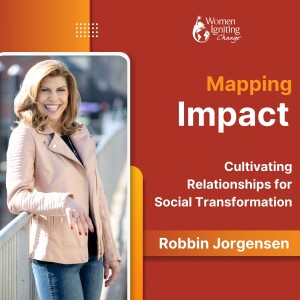
3 days ago
3 days ago
When it comes to creating real social impact and change, host Robbin Jorgensen explains, “It’s not something that you can do solo.” On this episode of Women Igniting Change, she walks you through her Social Impact Stakeholder Map, an eight-step process designed to help you understand the interconnections and interdependencies within and beyond your sphere of influence. Robbin asks you to rank people, institutions, and organizations in your life by their level of interest—those with whom you could potentially collaborate—and influence—those who can open doors for you that you can’t open yourself. You will also assess the strength of your current connections with each one.
Once you’ve identified your ideal network, the next step is to start reaching out. Robbin explains how to approach people and organizations professionally to lay the groundwork for success and make a lasting impression. Learn who your best points of contact are, the best social media platforms for networking, and the proper research to conduct before initiating contact.
Break out your markers and post-its and get ready to expand your footprint—and have fun in the process.
Quotes
“You’re going to need a multitude of individuals to help you create real social impact and change - it’s not something you can do solo.” (2:28 | Robbin Jorgensen)
“Always keep in mind that vision that you have for your social change as you’re thinking through these different questions.” (7:55 | Robbin Jorgensen)
“Now, I want you to dive into thinking through the centers of influence. Those are individuals and/or organizations that are really well-regarded in the space that you want to influence and impact, and they have a ton of credibility and potential to provide introductions for you and/or resources that you may not have access to. So, they tend to have really impressive decision-making power, and they have tremendous assets to help you achieve this social impact and vision.” (10:43 | Robbin Jorgensen)
Links
Social Impact Stakeholder Map
Connect with Robbin Jorgensen (She/Her):
Website: https://womenignitingchange.com
LinkedIn: https://www.linkedin.com/company/women-igniting-change/
LinkedIn: https://www.linkedin.com/in/robbinjorgensen/
Facebook: https://www.facebook.com/robbin.jorgensen/
Podcast production and show notes provided by HiveCast.fm
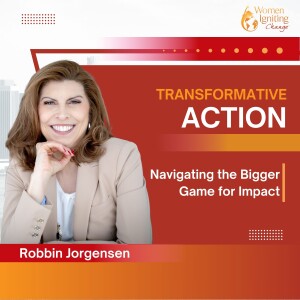
Monday Jun 17, 2024
Monday Jun 17, 2024
Change makers—believe it or not, we’re already halfway through 2024. Where are you in your mission toward creating lasting social change? Have you begun? To help you refocus and set your intentions for the rest of the year, Robbin revisits the episode where she introduced The Bigger Game, an innovation model designed to help you map out and intentionally design the change you want to make in the world. She walks you through the nine-square grid model, prompting you to consider essential questions like your deeper “why,” what scares you (in a good way), and what investments are needed for your mission to succeed.
Women, especially, often need a precise roadmap before taking risks. One setback can make us want to give up entirely. At the center of this model is the most important skill: taking bold action. Without it, as Robbin says, it’s all just a nice conversation.
Are you ready to take bold action? Join Robbin as she guides you through the questions that will help you build a long-lasting legacy.
Quotes
“And for women especially, this is the one that typically stops us—because we can’t see all 15 steps laid out in front of us as to how something is going to transpire, we talk ourselves out of it—’Nope, I can’t possibly do it.’ But when you’re playing a bigger game, you have to lean in and trust that the how is just going to show up as you take steps toward that bigger game and I promise you it does, every single time.” (2:59 | Robbin Jorgensen)
“Give yourself permission to dream and imagine that deep desire for social change that you want to put out there. It’s an invitation to turn that dial back up and dare to want for something more than just you.” (7:37 | Robbin Jorgensen)
“People who say to you, ‘That is the dumbest idea I’ve ever heard. You can’t possibly do that. What are you thinking?’ Those are allies, too, and here’s why: When they say something like that to you, I want your response to be, ‘Oh, yeah? Watch me. I’ve got this.’” (11:47 | Robbin Jorgensen)
“This legacy of what you’re putting out into the world lives beyond you. In the United States, for those of you who are familiar with this organization Mothers Against Drunk Driving, if I asked you who the two women were who started it, probably no one would be able to answer it. And we deliver The Bigger Game in workshops inside organizations and no one has known the answer to this. And it’s not that those two women are not important, what’s important is what they put out into the world sustained their involvement in it.” (12:34 | Robbin Jorgensen)
“Without bold action, the rest of it is just a really nice conversation.” (14:56 | Robbin Jorgensen)
Links
Connect with Robbin Jorgensen (She/Her):
Website: https://womenignitingchange.com
LinkedIn: https://www.linkedin.com/company/women-igniting-change/
LinkedIn: https://www.linkedin.com/in/robbinjorgensen/
Facebook: https://www.facebook.com/robbin.jorgensen/
Podcast production and show notes provided by HiveCast.fm
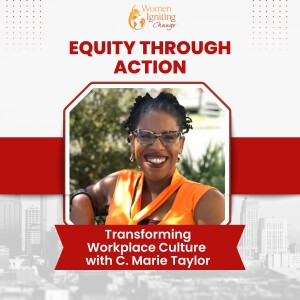
Monday Jun 10, 2024
Monday Jun 10, 2024
“How do we think about people and create an environment where we see each other as human beings contributing to the work?” C. Marie Taylor, President and Principal Consultant at Equity Through Action, is at the forefront of fostering safer, more inclusive workplaces. Her focus is on empowering historically marginalized individuals to be fully recognized and valued. In this episode of Women Igniting Change, she discusses with host Robbin Jorgensen the critical examination of the 3 Ps: people, policies, and practices. They explore how misalignments between company and personal values can impact workplace culture and the work itself, particularly in the pressing current climate of the U.S.
C. Marie often finds that leaders mistakenly believe they are exempt from needing change, not realizing they might benefit most. She illustrates how a leader’s satisfaction with the workplace culture can falsely imply that all employees feel the same. The episode delves into the complexities of navigating politics at every level and differentiating between policy and personal preference.
Tune in to today’s conversation for insights into the evolving workplace and learn how you can contribute to enhancing diversity and inclusion within your own organization.
Quotes
“Some of the misconceptions that folks really have going into this is that it can be solved with one or two trainings. That leadership doesn’t need to be part of the trainings. Seriously. They say, ‘Oh, no. This is for the middle level managers and the direct line folks,’ I say, ’No, it’s actually you. Bob. Jamal. Linda. It’s you and the things that you say and how you show up.” (11:44 | C. Marie Taylor)
“So there’s this misconception that, ‘Oh, we have this great culture because I’m happy and the leaders are happy. But you haven’t looked at anybody else. And so when I come in and the organization, the team comes in—because it’s not just me—comes in and says, ‘Well, here’s what’s happening from all the individuals, this is the collective culture that’s happening, not the one that you think is happening.’” (13:06 | C. Marie Taylor)
“Your humanity is tied up in my humanity, and if we don’t continue to recognize that, we’re going to continue to suffer. So it’s really pulling ourselves back and then just centering my humanity with yours and understanding that it’s tied together in work, in the community, whether I’m crossing the street or in the grocery store. If we could do that, the world would be a better place.” (27:11 | C. Marie Taylor)
Links
Connect with C. Marie Taylor:
Website: www.equitythroughaction.com
Connect with Robbin Jorgensen (She/Her):
Website: https://womenignitingchange.com
LinkedIn: https://www.linkedin.com/company/women-igniting-change/
LinkedIn: https://www.linkedin.com/in/robbinjorgensen/
Facebook: https://www.facebook.com/robbin.jorgensen/
Podcast production and show notes provided by HiveCast.fm
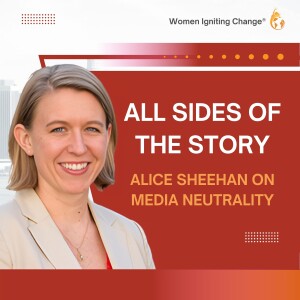
Monday Jun 03, 2024
Monday Jun 03, 2024
“Our goal is to reveal bias, not to tell you what to think,” says today’s guest Alice Sheehan, CEO and CFO of AllSides, an organization focused on strengthening our democracy with balanced news, media bias ratings and real conversations. On today’s episode of Women Igniting Change, she talks with host Robbin Jorgensen about AllSides’ mission to move away from the old ‘Ministry of Truth’ style news to bring people credible and unbiased news. She talks about the value of feedback, and the importance of diversity in all aspects of life.
She explains the various types of news bias, including the one that can make family members gathered around the dinner table feel like they are living on different planets. For its part, AllSides is working to draw people back toward civil discourse. Alongside the organization Living Room Conversations, it’s launched Mismatch, an initiative to help students in school learn how to have productive dialog with people with whom they disagree. Alice talks about the further impact AllSides has had in schools, particularly in light of the recent push toward including digital literacy in classroom curriculum.
Alice joined AllSides looking for a new sense of purpose. Her career is an example to so many women who are afraid to pivot: when change is calling you, don’t be afraid to answer.
Quotes
“Back in college, I had taken a vocations class and they had introduced me to this idea of asking yourself three questions: What are you good at? What makes you happy? What does the world need?’ And if you can find something that’s in the intersection of those three questions, that’s the sweet spot.” (2:09 | Alice Sheehan)
“It’s all about how we define ourselves as humans, which is in a multitude of ways. It’s race, it’s gender, it’s age, socioeconomic status, where I grew up, what the composition of my family was. All of that goes into perspective, and some of our perspective gets defined as politics, but a lot of it doesn’t have anything to do with politics.” (10:15 | Alice Sheehan)
“Credibility changes constantly with any outlet. So, they might get one story really right and they might get one story really, really wrong and print a retraction, or maybe they never do. And that happens across the board. Whereas we find that bias is more consistent. So, we have consistently focused on bias. Where we get a lot of feedback is people want us to focus on credibility.” (13:56 | Alice Sheehan)
“We see this a lot, actually, in our current context where the Right-leaning sources will really focus on a story that the Left won’t even mention. And the Left-leaning sources will focus on a story that the Right won’t even mention. And so then when people are talking to each other at their dinner table at Thanksgiving, it’s like they’re in two different worlds.” (17:59 | Alice Sheehan)
Links
Connect with Alice Sheehan:
https://www.allsides.com/unbiased-balanced-news
www.mismatch.org
Connect with Robbin Jorgensen (She/Her):Website: https://womenignitingchange.comLinkedIn: https://www.linkedin.com/company/women-igniting-change/LinkedIn: https://www.linkedin.com/in/robbinjorgensen/Facebook: https://www.facebook.com/robbin.jorgensen/
Podcast production and show notes provided by HiveCast.fm
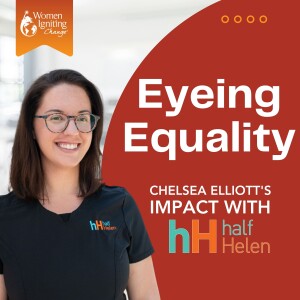
Monday May 27, 2024
Monday May 27, 2024
An early childhood vision test revealed that Chelsea Elliott was partially blind, a discovery that set her on a path to vision advocacy. In this episode of "Women Igniting Change," host Robbin Jorgensen talks with Chelsea, founder and Executive Director of half Helen and a Nexstar Media Remarkable Woman for 2024. Motivated by her own experiences, Chelsea has dedicated her life to advocating for earlier and more frequent vision screening and interventions for children.
Through her nonprofit, half Helen, Chelsea provides essential screening technology, consultations, and eyewear to the Austin community, focusing on mitigating severe vision issues and enhancing the quality of life for many, including seniors and those in underserved populations. She discusses her journey in developing mobile optometry clinics and her advocacy for legislation that supports the use of photo screening technology for all school-aged children across Texas.
Chelsea emphasizes that healthy vision is critical for all aspects of life and is often overlooked until a problem arises. She notes that 63% of children suffer from vision issues that are frequently misdiagnosed as learning or behavioral problems. Vision screenings also serve as vital tools for diagnosing other health issues within the body, such as diabetes, highlighting the importance of integrating eye care into primary health care.
Chelsea reflects on the value of perseverance, the importance of networking, and the power of collective action. She stresses that collaborative efforts ("we") are more impactful than individual endeavors ("I") in creating sustainable changes. Join us to hear how Chelsea's dedication to vision health is opening eyes across Texas and beyond.
Quotes
“It’s not enough to just give someone a pair of glasses. One of the biggest challenges I combat in my role is—people assume you should just be grateful. Just give them a pair of glasses and that solves their problem but if they don’t feel comfortable wearing them or they don’t like them, they will not wear them so you’re basically wasting resources. So, why not figure out how to offer a service that meets both of those needs and allows us to treat our patients with the dignity that they deserve?” (9:22 | Chelsea Elliott)
“I measure success when patients come back and say, ‘I feel safe cooking again’ or ‘I haven’t cut my hand, I haven’t burned myself because I can see now.’ One challenge I have with communicating our changing outcomes to funders is, your eyesight plays a role in every activity from the time you wake up to the time you go to sleep, so it’s really challenging to pinpoint what role your eyesight doesn’t play.” (14:21 | Chelsea Elliott)
“The eyeball is the only organ that allows you to look inside the body without cutting it open, which makes it so cool and makes it such an easy access point to learn. We can tell if you’re hypertensive, if you’ve had a stroke, if you have diabetes, we can tell several health conditions—cancer—by looking in the eye.” (20:31 | Chelsea Elliott)
Links
Connect with Chelsea Elliott:
Website: https://halfhelen.org/
Mission Video: https://www.youtube.com/watch?v=yjDlzeAn57E
Connect with Robbin Jorgensen (She/Her):
Website: https://womenignitingchange.com
LinkedIn: https://www.linkedin.com/company/women-igniting-change/
LinkedIn: https://www.linkedin.com/in/robbinjorgensen/
Facebook: https://www.facebook.com/robbin.jorgensen/
Podcast production and show notes provided by HiveCast.fm
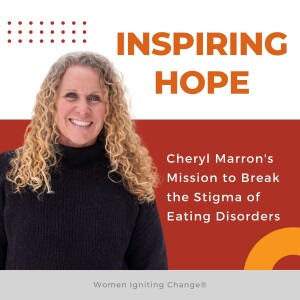
Monday May 20, 2024
Monday May 20, 2024
“I had to remove the mother aspect and remove the emotion, which was really hard in the beginning,” says Cheryl Marron, founder of Flutters of Hope, whose mission is to spread hope, compassion and understanding and to break the stigma surrounding eating disorders. She joins the Women Igniting Change podcast to tell the story of her daughter, who at the age of 11 began displaying symptoms of disordered eating. She shares the complicated and often frustrating process of finding help for her daughter, how her own background in counseling influenced that process, and some of the telltale signs and symptoms that something might be going on with your child.
Eating disorder recovery is an ongoing and often isolating process. Flutters of Hope provides baskets full of care items, resources as well as financial support and personalized notes assuring those afflicted–as well as their families–with a message that they are not alone. Cheryl details the staggering cost of recovery, and as a deeply spiritual person, the signs she received along the journey telling her to continue building Flutters of Hope.
What should a caretaker’s first concern be when caring for someone with an eating disorder, and what would she do differently if she could go back? Find out on today’s episode.
Quotes
“We just utilized what little was available to us. We had a counselor, we had a nutritionist, we had what would be called a behavioralist, but really wasn’t. We had the endocrinologist and we had the primary, all of which was unfortunate because they weren’t cohesive, they were not communicating. So each person, each therapy, was very different, different modalities, so we struggled with ‘Who do we listen to?’ Meanwhile, the eating disorder was getting extremely worse. She wasn’t making any progress.” (3:21 | Cheryl Marron)
At one point, I said, ‘All right, I’m not a mom. What would I tell my clients? How would I tell my clients to help her?’ So, I had to remove the mother aspect and remove the emotion, which was really hard in the beginning, and say, ‘No, this is what we’re doing, being very matter-of-fact, being very structured.” (7:00 | Cheryl Marron)
“You’re fluttering. You’re up and down. That’s where the flutter comes from. You’re never going to be in a straight line. With an eating disorder, there’s no, ‘I take a pill and I’m better.’ It doesn’t work that way. It’s ongoing.” (9:30 | Cheryl Marron)
“This illness costs a lot of money. It’s not something you budget. It’s long term, it’s ongoing and it does add up.” (15:00 | Cheryl Marron)
“Our words are powerful, and it only takes one comment or one situation to make that lightbulb go off. So, it’s really important that we try to educate as many people as we can.” (16:29 | Cheryl Marron)
Links
Connect with Cheryl Marron:
Website: https://www.fluttersofhopeinc.org
Connect with Robbin Jorgensen (She/Her):
Website: https://womenignitingchange.com
LinkedIn: https://www.linkedin.com/company/women-igniting-change/
LinkedIn: https://www.linkedin.com/in/robbinjorgensen/
Facebook: https://www.facebook.com/robbin.jorgensen/
Podcast production and show notes provided by HiveCast.fm
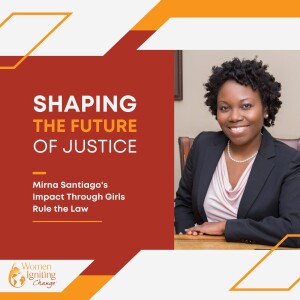
Monday May 13, 2024
Monday May 13, 2024
“There should be something I can do to make it easier for the girls who had my own experiences so they’re not bumping around in the dark like I was,” says today’s guest Mirna Santiago, lawyer lecturer and “bias-buster” who founded Girls Rule the Law, which provides underprivileged and underrepresented middle and high school girls the opportunity to learn about the law, the legislature and the judiciary. An Afro-Latina immigrant to the South Bronx, Mirna grew up feeling underrepresented and alone in her lived experiences. Only after returning to the Bronx years later, and seeing how little had changed, did she realize it was up to her to show young women what the world holds for them if they’re willing to roll up their sleeves. On today’s episode, Mirna talks to host Robbin Jorgensen about the programs that Girls Rule the Law offers, including the mock trial series that both ignite students’ passion and provide them with the frameworks that will allow them to make their voices heard.
Following the dictum that “your network determines your net worth,” Girls Rule events put students in touch with professional women from across the legal profession. They learn etiquette, interviewing skills, resume building and are granted access to the kind of professional attire that will allow them to move fluidly in a variety of situations.
How is Girls Rule shaping the future of justice? Find out on today’s episode.
Quotes
“There should be something I can do to make it easier for the girls who had my own experiences so they’re not bumping around in the dark like I was.” (2:39 | Mirna Santiago)
“So, we’re trying to create a network of women that are going to help these young ladies, give them internships and jobs and that sort of thing. And that was really the impetus. It was just like, ‘Oh, my God, I ran away from this place all these years ago and it’s still exactly the same.’ And it’s not fair to the kids that are still here that people like me do run away.” (7:09 | Mirna Santiago)
“I don’t feel that the impetus is going to be there when I retire. It’s not going to be there 13,15 years from now because things are happening now. There are rollbacks of our reproductive rights right now, there are rollbacks of other people’s freedoms now, with the LGBTQ. So, for me, I feel like I need to empower women to speak out now, to be in the places that matter now, and not 15 years from now or 13 years from now when it would be easiest for me to do. It’s not always easy to do what’s right.” (9:01 | Mirna Santiago)
“If you can see it, you can be it. Initially when I went to the schools, I would try to dress down because I just wanted them to see me as one of the people they see every day. And they started asking me, ‘Well, is that what you’d wear to court?’ and I thought, ‘Oh, wow.’ So, I started going in suits and they were far more impressed with that.” (15:46 | Mirna Santiago)
“The kids want to feel like they’re having fun even as they’re learning, and I think everybody really wants that.” (22:56 | Mirna Santiago)
Links
Connect with Mirna Santiago:
Website: https://girlsrulethelaw.org/
LinkedIn: https://www.linkedin.com/in/mirna-s-95193a10/
Implicit Bias Assessment: https://implicit.harvard.edu/implicit/takeatest.html
Connect with Robbin Jorgensen (She/Her):
Website: https://womenignitingchange.com
LinkedIn: https://www.linkedin.com/company/women-igniting-change/
LinkedIn: https://www.linkedin.com/in/robbinjorgensen/
Facebook: https://www.facebook.com/robbin.jorgensen/
Podcast production and show notes provided by HiveCast.fm
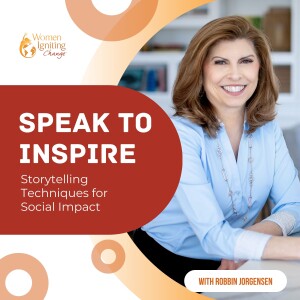
Monday May 06, 2024
Monday May 06, 2024
“It’s more than just telling of events; it’s really about making connections,” says host Robbin Jorgensen about the importance of effective storytelling to the impact of your message. Today she’ll share three key steps to take to ensure your audience, whether at a large event or in a small meeting room, hears your message, connects to it, and forms a long-lasting relationship with you as a result. She’ll share the three types of audience members that you’ll want to engage and how to ensure your message captivates them all.
She’ll also share tips for an engaging presentation style that will help you carry your story confidently from the beginning to end. Learn how to determine the best platform and mode of delivery to meet your target audience where they are.
Your message matters and only you can deliver it in your own unique way. Join today’s episode of Women Igniting Change to learn how to make the world sit up and listen.
Quotes
“It’s more than just telling of events; it’s really about making connections. And it’s how we turn abstract ideas and emotions into action. Great stories foster that human connection, while making sometimes really complex ideas understandable and relatable at the same time.” (1:02 | Robbin Jorgensen)
“Before you can even begin to craft your story, you need to be really clear about what you want to achieve.” (1:51 | Robbin Jorgensen)
“Just be you. The most impactful stories are those that are told with passion and sincerity—and trust me, your audience can absolutely feel the difference, so be authentic.” (4:55 | Robbin Jorgensen)
“There are so many different ways to get your message and your storytelling out there. So, be really creative in how that happens, and then choose your medium—to the degree that you can—that best suits your message and your audience.” (7:55 | Robbin Jorgensen)
“Command that space and know that you belong in front of whatever room you’re in, and that what you have to say matters.” (10:41 | Robbin Jorgensen)
Links
Connect with Robbin Jorgensen (She/Her):
Website: https://womenignitingchange.com
LinkedIn: https://www.linkedin.com/company/women-igniting-change/
LinkedIn: https://www.linkedin.com/in/robbinjorgensen/
Facebook: https://www.facebook.com/robbin.jorgensen/
Podcast production and show notes provided by HiveCast.fm
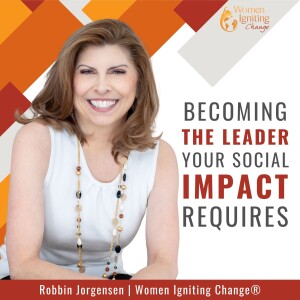
Monday Apr 29, 2024
Monday Apr 29, 2024
“If you’re going to be the face of whatever this social impact is, how do you need to show up differently than you do now?,” asks host Robbin Jorgensen. On this episode of Women Igniting Change, she asks you to think ahead five years about the level of social impact you want to be making, and then tells you what you need to begin doing now to be the kind of leader who will rise to that occasion. You’ll have to dig deep, and even become a little obsessed but with Robbin’s advice, you’ll soon be setting your future goals in motion.
Start with these questions: Who are the key figures in your space and who would you like to emulate? What beliefs do you need to adopt and which do you need to leave behind to become who you want to become? Learn the affirmation statement she recommends writing down to bolster your conviction and sense of self, as well as which question is so crucial she asks it twice.
Quotes
“As you step out and put your talents and your expertise and your guidance and your passion out there, it is going to require more and it’s going to require that you step into the leader that you need to be in order to make that happen.” (0:43 | Robbin Jorgensen)
“Begin to think through the skills that you’re going to need five years from now based on where you would like your social impact to be and who you need to be to run it at that time.” (3:18 | Robbin Jorgensen)
“If you’re going to be the face of whatever this social impact is, how do you need to show up differently than you do now?” (4:34 | Robbin Jorgensen)
“What do you expect of yourself to make your social impact happen? This is a really big question. And I will tell you, for us, when we started working in Rwanda seven years ago, I really had to step back and ask myself that question. What was I going to expect of me, what was I going to expect of my team that was greater than where we were at the time? Really embody that and put yourself in the spirit of that.” (6:48 | Robbin Jorgensen)
“Who are some of the leaders that you deeply admire in the world? These can be part of your family, your community, or famous people you know who are leaders in your mind? Why do you admire and respect them as a leader?” (9:25 | Robbin Jorgensen)
Links
Connect with Robbin Jorgensen (She/Her):
Website: https://womenignitingchange.com
LinkedIn: https://www.linkedin.com/company/women-igniting-change/
LinkedIn: https://www.linkedin.com/in/robbinjorgensen/
Facebook: https://www.facebook.com/robbin.jorgensen/
Podcast production and show notes provided by HiveCast.fm
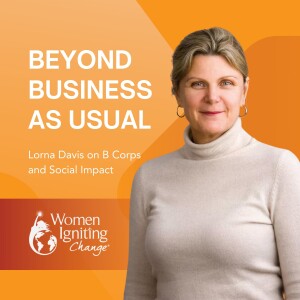
Monday Apr 22, 2024
Monday Apr 22, 2024
“Businesses should have a social conscience,” says Lorna Davis, former CEO of Danone North America and a fervent advocate for using business as a force for good. “They need to be held to account for their impact on the people and the planet whose resources they use.” On this episode of Women Igniting Change, Lorna recounts her eye-opening experience in China, which pivoted her career towards sustainability and social responsibility. This shift led her to champion the B Corp movement, where businesses commit to high standards of social and environmental performance, accountability, and transparency.
Lorna shares the challenges she faced while integrating Danone with WhiteWave, steering the newly formed conglomerate toward B Corp certification, and establishing a mission that encourages employees to pursue a purpose larger than their daily tasks. She shares insights from her TED Talk on collaborative and purpose-driven leadership, emphasizing the role of impactful work that leaves a legacy to be proud of.
By discussing practical steps that businesses can take—such as starting with a single unit and employing tools like the B Corp impact assessment to gauge their societal impact—this highlights the importance of local action and legislative influence in the regions where businesses operate. It also foresees the varied evolution of the B Corp movement across different geographies.
Lorna urges listeners to let their heartbreak fuel their actions towards meaningful change. Join today’s discussion to learn how you can contribute to a sustainable future and tackle the issues that resonate with you.
Quotes
“I think much less about purpose than I used to just because I see that impact is not really up to me.” (09:29 | Lorna Davis)
“The days of a corporation saying "It's not my business to get involved in the legislation in the jurisdiction in which I operate" are over. If you are in a territory in which you are using resources, you are paying taxes, and you are benefiting from the resources that you're using, you are responsible for influencing the legislation in that area.” (24:30 | Lorna Davis)
“Collaboration allows so many things that you can't do while you're on your own. That's one area that I would really focus on.” (26:54 | Lorna Davis)
“We did a big study of this in Union Square in New York City where you partner with the local council and work out how to actually solve this problem in real life. What that leads you to do is a whole lot of things. It leads you to make relationships with people you don't normally make relationships with. It leads you to do some trials and tests and to learn a whole lot of things that you didn't know before. Then, maybe you'll find a solution that's actually really useful for the planet. I just made one small example, but think as small as you possibly can for your first step.” (29:44 | Lorna Davis)
“It's important for you to hang out with people who you want to be like and who challenge you. Because the thing about being in your own little frame is you can be really pleased with yourself.” (35:00 | Lorna Davis)
Links
Connect with Lorna Davis:
https://www.linkedin.com/in/lorna-davis-3366ab14/
https://www.ted.com/talks/lorna_davis_a_guide_to_collaborative_leadership?language=en
https://www.bcorporation.net/en-us/
Connect with Robbin Jorgensen (She/Her):
Website: https://womenignitingchange.com
LinkedIn: https://www.linkedin.com/company/women-igniting-change/
LinkedIn: https://www.linkedin.com/in/robbinjorgensen/
Facebook: https://www.facebook.com/robbin.jorgensen/
Podcast production and show notes provided by HiveCast.fm

Women Igniting Change®
Founder and CEO of Women Igniting Change®, is your host. A former corporate executive, passionate human and women's rights activist, and global speaker, who has worked with women leaders in 14 countries on 6 continents believes that unleashing the contribution of women is one of the key drivers to moving business and humanity forward.


